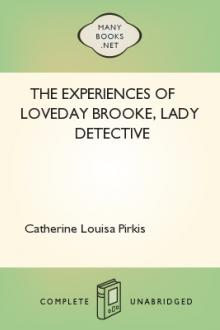The Experiences of Loveday Brooke, Lady Detective - Catherine Louisa Pirkis (read aloud books .TXT) 📗

- Author: Catherine Louisa Pirkis
- Performer: -
Book online «The Experiences of Loveday Brooke, Lady Detective - Catherine Louisa Pirkis (read aloud books .TXT) 📗». Author Catherine Louisa Pirkis
She gave a little sigh.
“I suppose you are right,” she answered; “it is a holiday in little more than name. I verily believe that we hard workers, after a time, lose our capacity for holiday-keeping. I thought I was pining for a week of perfect laziness and sea-breezes, and so I locked up my desk and fled. No sooner, however, do I find myself in full view of that magnificent sea-and-sky picture than I shut my eyes to it, fasten them instead on the daily papers and set my brains to work, con amore, on a ridiculous case that is never likely to come into my hands.”
That “magnificent sea-and-sky picture” was one framed by the windows of a room on the fifth floor of the Métropole, at Brighton, whither Loveday, overtaxed in mind and body, had fled for a brief respite from hard work. Here Inspector Clampe, of the Local District Constabulary, had found her out, in order to press the claims of what seemed to him an important case upon her. He was a neat, dapper-looking man, of about fifty, with a manner less brusque and business-like than that of most men in his profession.
“Oh pray drop the ridiculous case,” he said earnestly, “and set to work, ‘con amore,’ upon another far from ridiculous, and most interesting.”
“I’m not sure that it would interest me one quarter so much as the ridiculous one.”
“Don’t be sure till you’ve heard the particulars. Listen to this.” Here the inspector took a newspaper-cutting from his pocket-book and read aloud as follows:
“‘A cheque, the property of the Rev. Charles Turner, Vicar of East Downes, has been stolen under somewhat peculiar circumstances. It appears that the Rev. gentleman was suddenly called from home by the death of a relative, and thinking he might possibly be away some little time, he left with his wife four blank cheques, signed, for her to fill in as required. They were made payable to self or bearer, and were drawn on the West Sussex Bank. Mrs. Turner, when first questioned on the matter, stated that as soon as her husband had departed, she locked up these cheques in her writing desk. She subsequently, however, corrected this statement, and admitted having left them on the table while she went into the garden to cut some flowers. In all, she was absent, she says, about ten minutes. When she came in from cutting her flowers, she immediately put the cheques away. She had not counted them on receiving them from her husband, and when, as she put them into her Davenport, she saw there were only three, she concluded that that was the number he had left with her. The loss of the cheque was not discovered until her husband’s return, about a week later on. As soon as he was aware of the fact, he telegraphed to the West Sussex Bank to stop payment, only, however, to make the unpleasant discovery that the cheque, filled in to the amount of six hundred pounds, had been presented and cashed (in gold) two days previously. The clerk who cashed it took no particular notice of the person presenting it, except that he was of gentlemanly appearance, and declares himself to be quite incapable of identifying him. The largeness of the amount raised no suspicion in the mind of the clerk, as Mr. Turner is a man of good means, and since his marriage, about six months back, has been refurnishing the Vicarage, and paying away large sums for old oak furniture and for pictures.’”
“There, Miss Brooke,” said the inspector as he finished reading, “if, in addition to these particulars, I tell you that one or two circumstances that have arisen seem to point suspicion in the direction of the young wife, I feel sure you will admit that a more interesting case, and one more worthy of your talents, is not to be found.”
Loveday’s answer was to take up a newspaper that lay beside her on the table. “So much for your interesting case,” she said; “now listen to my ridiculous one.” Then she read aloud as follows:—
“‘Authentic Ghost Story.—The inhabitants of Fountain Lane, a small turning leading off Ship Street, have been greatly disturbed by the sudden appearance of a ghost in their midst. Last Tuesday night, between ten and eleven o’clock, a little girl named Martha Watts, who lives as a help to a shoemaker and his wife at No. 5 in the lane, ran out into the streets in her night-clothes in a great state of terror, saying that a ghost had come to her bedside. The child refused to return to the house to sleep, and was accordingly taken in by some neighbours. The shoemaker and his wife, Freer by name, when questioned by the neighbours on the matter, admitted, with great reluctance, that they, too, had seen the apparition, which they described as being a soldier-like individual, with a broad, white forehead and having his arms folded on his breast. This description is, in all respects confirmed by the child, Martha Watts, who asserts that the ghost she saw reminded her of pictures she had seen of the great Napoleon. The Freers state that it first appeared in the course of a prayer-meeting held at their house on the previous night, when it was distinctly seen by Mr. Freer. Subsequently, the wife, awakening suddenly in the middle of the night, saw the apparition standing at the foot of the bed. They are quite at a loss for an explanation of the matter. The affair has caused quite a sensation in the district, and at the time of going to press, the lane is so thronged and crowded by would-be ghost-seers that the inhabitants have great difficulty in going to and from their houses.’”
“A scare—a vulgar scare, nothing more,” said the inspector as Loveday laid aside the paper. “Now, Miss Brooke, I ask you seriously, supposing you get to the bottom of such a stupid, commonplace fraud as that, will you in any way add to your reputation?”
“And supposing I get to the bottom of such a stupid, commonplace fraud as a stolen cheque, how much, I should like to know, do I add to my reputation?”
“Well, put it on other grounds and allow Christian charity to have some claims. Think of the misery in that gentleman’s house unless suspicion can be lifted from the young wife and directed to the proper quarter.”
“Think of the misery of the landlord of the Fountain Lane houses if all his tenants decamp in a body, as they no doubt will, unless the ghost mystery is solved.”
The inspector sighed. “Well, I suppose I must take it for granted that you will have nothing to do with the case,” he said. “I brought the cheque with me, thinking you might like to see it.”
“I suppose it’s very much like other cheques?” said Loveday indifferently, and turning over her memoranda as if she meant to go back to her ghost again.
“Ye—es,” said Mr. Clampe, taking the cheque from his pocket-book and glancing down at it. “I suppose the cheque is very much like other cheques. This little scribble of figures in pencil at the back—144,000—can scarcely be called a distinguishing mark.”
“What’s that, Mr. Clampe?” asked Loveday, pushing her memoranda on one side. “144,000 did you say?”
Her whole manner had suddenly changed from apathy to that of keenest interest.
Mr. Clampe, delighted, rose and spread the cheque before her on the table.
“The writing of the words “six hundred pounds,” he said, “bears so close a resemblance to Mr. Turner’s signature, that the gentleman himself told me he would have thought it was his own writing if he had not known that he had not drawn a cheque for that amount on the given date. You see it is that round, schoolboy’s hand, so easy to imitate, I could write it myself with half-an-hour’s practice; no flourishes, nothing distinctive about it.”
Loveday made no reply. She had turned the cheque, and was now closely scrutinizing the pencilled figures at the back.
“Of course,” continued the inspector, “those figures were not written by the person who wrote the figures on the face of the cheque. That, however, matters but little. I really do not think they are of the slightest importance in the case. They might have been scribbled by some one making a calculation as to the number of pennies in six hundred pounds—there are, as no doubt you know, exactly 144,000.”
“Who has engaged your services in this case, the Bank or Mr. Turner?”
“Mr. Turner. When the loss of the cheque was first discovered, he was very excited and irate, and when he came to me the day before yesterday, I had much difficulty in persuading him that there was no need to telegraph to London for half-a-dozen detectives, as we could do the work quite as well as the London men. When, however, I went over to East Downes yesterday to look round and ask a few questions; I found things had altogether changed. He was exceedingly reluctant to answer any questions, lost his temper when I pressed them, and as good as told me that he wished he had not moved in the matter at all. It was this sudden change of demeanour that turned my thoughts in the direction of Mrs. Turner. A man must have a very strong reason for wishing to sit idle under a loss of six hundred pounds, for, of course, under the circumstances, the Bank will not bear the brunt of it.”
“Some other motives may be at work in his mind, consideration for old servants, the wish to avoid a scandal in the house.”
“Quite so. The fact, taken by itself, would give no ground for suspicion, but certainly looks ugly if taken in connection with another fact which I have since ascertained, namely, that during her husband’s absence from home, Mrs. Turner paid off certain debts contracted by her in Brighton before the marriage, and amounting to nearly £500. Paid them off, too, in gold. I think I mentioned to you that the gentleman who presented the stolen cheque at the Bank preferred payment in gold.”
“You are supposing not only a confederate, but also a vast amount of cunning as well as of simplicity on the lady’s part.”
“Quite so. Three parts cunning to one of simplicity is precisely what lady criminals are composed of. And it is, as a rule, that one part of simplicity that betrays them and leads to their detection.”
“What sort of woman is Mrs. Turner in other respects?”
“She is young, handsome and of good birth, but is scarcely suited for the position of vicar’s wife in a country parish. She has lived a good deal in society and is fond of gaiety, and, in addition, is a Roman Catholic, and, I am told, utterly ignores her husband’s church and drives every Sunday to Brighton to attend mass.”
“What about the servants in the house? Do they seem steady-going and respectable?”
“There was nothing on the surface to excite suspicion against any one of them. But it is precisely in that quarter than your services would be invaluable. It will, however, be impossible to get you inside the vicarage walls. Mr. Turner, I am confident, would never open his doors to you.”
“What do you suggest?”
“I can suggest nothing better than the house of the





Comments (0)